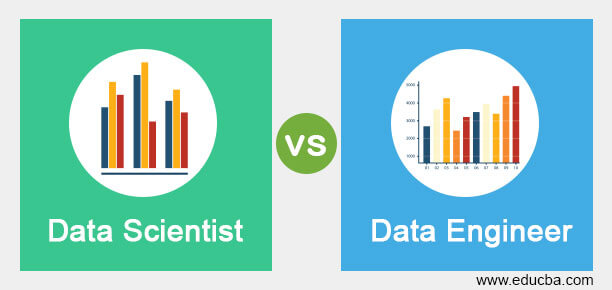Updated April 28, 2023
Difference Between Data Scientist and Data Engineer
The number of job opportunities available for data engineers is approximately five times more than that for data scientists. Data Scientist and Data Engineer are two tracks in Bigdata. Generally, Data Scientist performs analysis of data by applying statistics and machine learning to solve critical business issues. In short, they do advanced data analysis driven and automated by machine learning and computer science. Data engineers, on the other hand, are software engineers who design, build, and integrate data from various resources and manage big data. And also prepare extensive data infrastructure to be analyzed by Data Scientists.
Key Differences Between Data Scientist vs. Data Engineer
The difference between Data Scientist and Data Engineer is as follows:
| Basis for Comparision | Data Scientist | Data Engineer |
| Responsibilities |
|
|
| Job Outlook |
|
|
| Need to Develop Knowledge and Expertise | Data Scientists need to be experts in communicating and presenting the results of their analysis. | Data Engineers need to be expertise in system monitoring and data Cleaning. |
Comparison Table
Mentioned below is the comparison table :
| Basis for Comparision | Data Scientist | Data Engineer |
| Tools | They use tools like Matlab, SAS, Jupyter, and RStudio. | They use tools like Oracle, Hadoop, MySQL, Hive, DashDB, MongoDB, and Cassandra. |
| They Work on | They work on Data Analysis, Statistics, Machine learning, Data Mining, Research, Statistical modeling, Algorithms, and Programming. | They work on Data Warehousing, ETL, Databases, and Business Intelligence. |
| Languages | They are very familiar with R, Python, LaTeX, etc languages. | They are very familiar with Java, Unix, JavaScript, Linux, SQL, etc languages. |
| Salaries | In a medium market, they will earn a minimum of $43k and a maximum of $364k. | Data Engineers in a Medium market will earn a minimum of $34k and a maximum of $341k. |
| Hired By | They get hired by Dropbox, Microsoft, Walmart, etc. | They get hired by Verizon, Bloomberg, Play station, etc. |
| Tasks Performed |
|
|
| Educational Background | Data Scientists are from computer science backgrounds and often study Econometrics, Mathematics, Statistics, and Operational Research. | Data Engineers are also from a Computer Science background and also Computer Engineering. |
Head-to-Head Comparison Between Data Scientist vs. Data Engineer (Infographics)
Below are the top 7 comparisons between Data Scientist vs. Data Engineer:
Data Scientist vs. Data Engineer Working Together
Both skill sets (Difference Between Data Scientist vs. Data Engineer) are critical for the data team to function correctly. It is demanding that we will be able to land a unicorn, a single individual with skills as Data Scientist and Data Engineer. Therefore, we must build a team where each member complements the other member’s skills. And they must work well by being together.
Recognizing their complementary roles in our business enterprise is essential to avoid this situation or dilemma. It is impossible to overstate how important the communication between a Data Scientist and Data Engineer is and how important it is to ensure that both Data Scientist and Data Engineering roles and teams are well-resourced and imagined. This is because data needs to be optimized to the use case of the Data Scientist. A clear understanding of how this works is essential in reducing the human error component of the data pipeline.
Failing to prepare adequately for this can doom our enterprise’s efforts. We need to eliminate the situation where Data Scientists are onboard without a data pipeline sufficiently done. This leaves them in the uncomfortable and expensive position of being forced to dig into the hardcode Data Engineering needed or remaining idle. Neither option is a good use of their capabilities or our enterprise’s resources.
Conclusion
In conclusion, both work together on the data. And they both are needed as finding all skills in a particular individual is difficult, so data scientists and data engineers must complement each other to work effectively for the Business Enterprise. Because Data Scientist’s worries about data pipelines are less productive, and Data Engineers’ concerns about business insights are less effective. By combining both, they work well.
Recommended Articles
This has been a guide to Data Scientist vs. Data Engineer. Here we have discussed Data Scientist vs. Data Engineer head-to-head comparison, key differences, infographics, and a comparison table. You may also look at the following articles to learn more –




